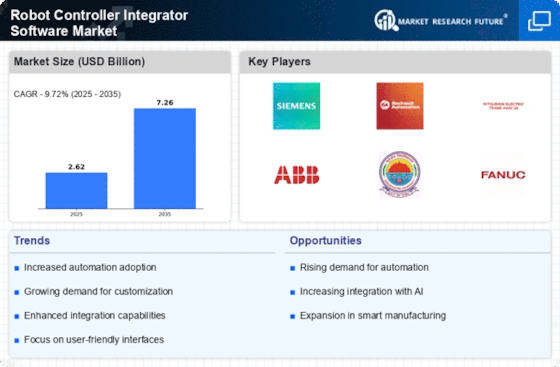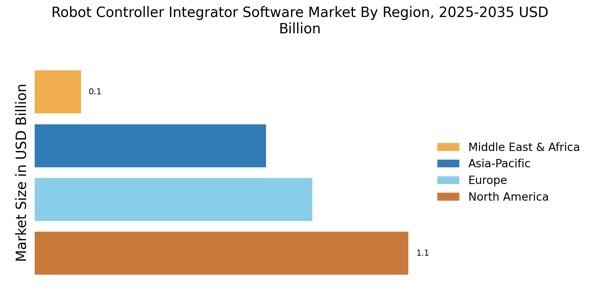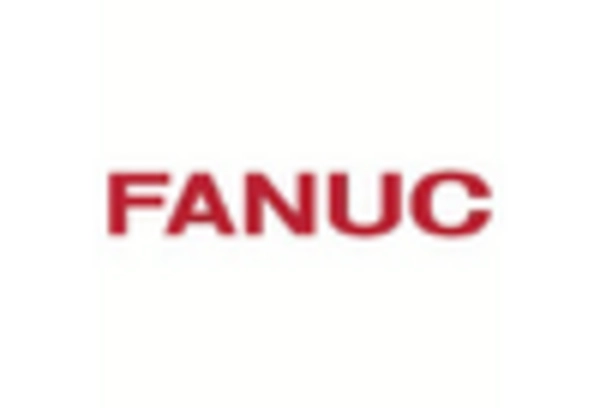Advancements in Robotics Technology
Technological advancements in robotics are propelling the Robot Controller Integrator Software Market forward. Innovations such as improved sensors, enhanced processing capabilities, and sophisticated algorithms are enabling robots to perform complex tasks with greater accuracy and reliability. The market for industrial robots is expected to reach substantial figures, with estimates suggesting a valuation exceeding 70 billion in the next few years. These advancements necessitate the development of robust controller software that can seamlessly integrate with various robotic systems. As companies invest in cutting-edge robotics technology, the demand for specialized software solutions that can enhance robot performance and adaptability is likely to increase, thereby driving growth in the Robot Controller Integrator Software Market.
Increased Automation in Manufacturing
The trend towards increased automation in manufacturing processes is a primary driver for the Robot Controller Integrator Software Market. As industries strive for higher efficiency and productivity, the demand for advanced robotic systems has surged. According to recent data, the automation market is projected to grow at a compound annual growth rate of over 10% in the coming years. This growth is largely attributed to the need for precision and speed in production lines, which robotic systems can provide. Consequently, the integration of sophisticated robot controller software becomes essential to manage these automated systems effectively. The Robot Controller Integrator Software Market is thus positioned to benefit significantly from this ongoing shift towards automation, as manufacturers seek to optimize their operations and reduce labor costs.
Rising Focus on Safety and Compliance
The rising focus on safety and compliance in industrial environments is driving the Robot Controller Integrator Software Market. As regulations surrounding workplace safety become more stringent, companies are compelled to adopt robotic solutions that not only enhance productivity but also ensure compliance with safety standards. The integration of safety features within robot controller software is becoming a priority, as organizations seek to mitigate risks associated with automation. Data suggests that the market for safety-compliant robotic systems is on the rise, with businesses investing in software that can monitor and manage safety protocols effectively. This emphasis on safety and compliance is likely to propel the demand for sophisticated robot controller integrator software, as companies strive to create safer working environments while leveraging automation.
Expansion of Robotics in Emerging Markets
The expansion of robotics in emerging markets is a notable driver for the Robot Controller Integrator Software Market. As economies in regions such as Asia-Pacific and Latin America continue to develop, there is a growing interest in adopting robotic technologies to enhance manufacturing capabilities. This trend is supported by government initiatives aimed at promoting automation and technological advancement. Market forecasts indicate that the adoption of robotics in these regions could lead to a significant increase in demand for robot controller software, as businesses seek to modernize their operations. The Robot Controller Integrator Software Market stands to gain from this expansion, as companies in emerging markets look for effective solutions to integrate and manage their robotic systems.
Growing Demand for Customization in Robotics
The growing demand for customization in robotics applications is a significant driver for the Robot Controller Integrator Software Market. As businesses across various sectors seek tailored solutions to meet specific operational needs, the ability to customize robotic systems becomes crucial. This trend is particularly evident in industries such as automotive, electronics, and healthcare, where unique production requirements necessitate specialized robotic solutions. Market analysis indicates that the customization segment is expanding rapidly, with companies increasingly looking for software that allows for flexible programming and integration. This shift towards personalized robotics solutions is likely to fuel the demand for advanced controller integrator software, as organizations aim to enhance their competitive edge through tailored automation strategies.
















